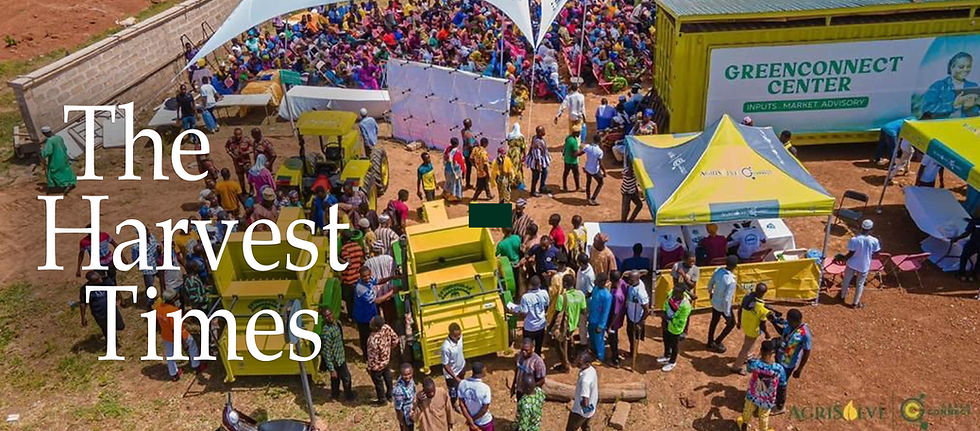Women in Rural Ghana: “We are ready to work if given the support.”
- Agrisolve
- Aug 6, 2023
- 4 min read
Updated: Aug 7, 2023
“We wish for our children to go to school, to other countries, and reach levels that they’re able to do things that can support other people.” – Women at Bugubelle

In the quiet town of Kulfuo in Ghana’s Upper West region, 22-year-old Seidu Mariam sits outside her home – with the pile of shea nuts she just plucked – as she breastfeeds her 1-year-old child. Her other 5-year-old is out in school.
Mariam will wash, boil and dry these shea nuts, then remove their shells to sell them. A bowl can fetch 10 cedis, she says.
“I finished high school at age 17 and went straight into farming,” she tells us. She mostly plants groundnuts and maize totaling about 4 acres. These shea nuts are an additional avenue for her to earn her own living.
Mariam is the youngest of her husband’s few wives. While getting married at a young age was something she did not have much of a say to, due to traditions and the fact that she could no longer support herself, she hopes she could better shape her destiny from hereon.
According to the United Nations, women make up 43 percent of the global agricultural labor force – yet they face significant discrimination when it comes to land ownership, equal pay, participation in decision-making entities and access to credit and financial services.
“Here, I’d have to work on my husband’s farm first before I can tend to my own. Also, the land that I got is not as fertile as my husband’s,” she says.
“Men leave everything to women – sometimes including money for our children to go to school. We don’t have access to tractors too and have to till the land with simple tools like hoes”.

A Sissala woman buying some herbicides from Agrisolve's Greenconnect Center in Funsi
Bridging gender imbalance in rural Ghana
In the past, if Mariam needed to get chemicals for her crops, she’d have to travel for over an hour to get to Tumu, the nearest business center.
“I used to feel bad because of how women are marginalized here, but not anymore. This is because I’m able to get access to fertilizers at a good price,” she says.
One of the challenges smallholder farmers faces is access to agricultural inputs.
Agrisolve has set up a Greenconnect Center (GCC) in Kulfuo a year ago to help provide farmers with easier access and more affordable means to seeds, fertilizers, herbicides, machinery services, as well as a marketplace (to sell their produce).
“On Saturdays, discounts [of about 10 percent] are given for only women at some of our GCCs,” says Agrisolve’s business development officer Abdulai Is-hak Tuurosung.
The brain behind this idea came from Nanssia Tortimmah Jibiliru the 6th, the Chief of Kulfuo town, which houses 3-thousand people.
“I consulted our elders on how to bridge gender imbalance in our part of town, and this idea came up,” he shares with us.
Chief Nanssia champions equality in women. “We are a young town. If there are no women behind you, there’s no success. Wives, daughters, women – they can help you multiply that success.”
“We wish that Agrisolve should grow. When it grows, Sissala land grows, Kulfuo also grows,” the Chief adds.

Awesome women at Bugubelle who are welcoming, earnest, and willing to do better
Education & Training for Women
Aside access to farm input, Agrisolve has also come up with a WeSolve project to support women smallholder farmers by training and educating them.
“I’ve learned how to manage my money from this program – calculating the amount I’d need to use to farm, such as for ploughing, seeds, fertilizers,” Mariam says.
“I have learnt the importance of saving. For instance, if I need to spend 10 cedis a day – to buy ingredients to cook for example – how do I manage it? Now, I’d save 5 cedis, or half of my budget. I didn’t use to save before,” she adds.
Mariam finds being part of a 25-strong women’s group helpful too. The women’s group supports one another, and pools savings to participate in loan programs – especially before the farming season.
“We are encouraged to have small boxes in the house where we’d save and then pool our savings together.”
In another community Bugubelle, women are excited about expanding the scale of their crops.
“In the past many of us would migrate to the South of the country (where it’s more developed) in search for jobs,” they say.
“But since Agrisolve came to us, we have learned how to do quality farming and have since seen improvements in every aspect. We’ve increased our acreage overtime, while also learned the importance of upskilling ourselves – this is why we also started processing [raw materials] when the season is over.”
These women say they no longer think of just selling their produce when they need money, but they have also become more open and driven to exploring other ways to increase their income. They have big dreams to further scale up and even eye to become commercial farmers one day.
“We wish for our children to go to school, to other countries, and reach levels that they’re able to do things that can support other people.”
“We women have a bigger role to play because we also take care of the family. But we are ready to work, to work hard, if given the right support.”
(Cover photo: Seidu Mariam right outside her home in Kulfuo, Upper West Region of Ghana)



Comments